Graduate Student Fellows
Congratulations to the ACES 2016 Student Fellows!
Join us on Thursday, December 8th from 12:00pm-1:05pm for ACES Fellows: The Next Generation, where our six ACES fellows will be providing thoughts and discussion about their ACES experience and perspectives on the future direction of ecosystem services.
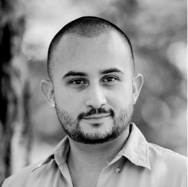
Marcello Hernández-Blanco
Marcello is Costa Rican, he has a Bachelors Degree in Industrial Engineering, a Masters in Science in Biodiversity, Wildlife and Ecosystem Health from the University of Edinburgh, and a Masters in Environmental Management from the Interamerican University of Costa Rica. He also has advanced studies in Biology with an emphasis on Sustainable Development from the Latin University of Costa Rica.
He is currently a PhD Scholar at the Australian National University under the supervision of Robert Costanza. His research focuses on the development of an alternative financial mechanism to the current payment for ecosystems services program of Costa Rica. He is also working on the national economic valuation of ecosystem services in Costa Rica (present and future) and the calculation of the Genuine Progress Indicator of the same country.
Marcello is a lead author for IPBES in the regional assessment for America, in which he coordinates de section on climate change and ecosystem services. He is the Co-chair for Central America of the Ecosystem Services Partnership. He is also currently works as international consultant on sustainable development in topics such as natural capital, corporate biodiversity management and climate change.
Marcello is currently a research fellow at the International Center of Economic Policy of the National University of Costa Rica, and he also teaches at Long Island University (campus in Costa Rica) in the Global Studies Program. He has been a lecturer at the University for the International Cooperation in the Masters Degree on Sustainable Business Management, and at the Latin University of Costa Rica in the Masters Degree on Environmental Management.
He currently also works as conservation photographer, trained by photographers from National Geographic and specialized in projects on sustainable development. His recent clients include Holcim, United Nations and IUCN.
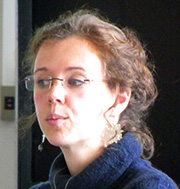
Solen Le Clec’h
Solen Le Clec’h is currently finishing her PhD in geography at LETG (CNRS 6554 - Université Rennes 2, France) and GEOPO (Universidade de São Paulo, Brazil). Her research work is part of a transdisciplinary project and focuses on deforestation dynamics in the Brazilian Amazon, where the landscape has been changing rapidly and recently. Her work is applied at two spatial scales: three localities of the pioneer fronts and the State of Pará. She bases her work the implementation of statistical methodologies to link satellite images at high and moderate spatial resolution and sampling data, in order to map one or several indicators of ecosystem services, in biophysical units. In this way, she helps understanding the spatial repartition and the structure of the ecosystem services indicators, in connection with the way farmers use their land and the structural components of the territory. She also highlights the limitations and issues underlying the notion of ecosystem services and its implementation through its quantification and cartographic representation. As part of her PhD, she gives various classes to license and master degree students. She also used to be one of the coordinators of the Institut des Amériques and she was then in charge of some scientific and academic cooperation between France and Brazil.

Colin Phifer
Colin Phifer is a PhD student at Michigan Technological University where he is part of an international, interdisciplinary team studying the socio-ecological effects of bioenergy development in four countries (Argentina, Brazil, Mexico and United States). Funded by the NSF’s Partnerships in International Research and Education program (PIRE), Colin’s research focuses on how land-use change associated with bioenergy development influences native bees, birds and ecosystem services while other PIRE team members examine hydrology, soil and carbon, and social and policy impacts. Colin worked in three of the PIRE countries to survey for both native bees and birds, and now is working to apply ecosystem service modeling to understand trade-offs with multiple ecosystem services and land-use change. The work presented at ACES 2016 focuses on understanding how large-scale afforested eucalyptus plantations in the Pampas grasslands of Argentina impacts ecosystem services. A new-comer to ecosystem service modeling, Colin wants to learn from the many practitioners and experts at ACES, and share this knowledge with his team to better integrate social and natural sciences.
Prior to joining the PIRE team, Colin completed his MSc at the University of Hawaii in conservation biology and his BS at from Humboldt State University in California. From bats to birds, plants to pollinators, gibbons to whales, Colin has worked in the US and abroad to conserve biodiversity and provide for human well-being. In addition to research, he has extensive experience as an environmental educator and outdoor guide. He wants his work to lead to actionable, impactful science and informed decision-making. He’s worked for US Forest Service, National Park Service, WA Department of Natural Resources, several NGOs (and quite a few restaurants…including as a singing waiter!). When not working, he enjoys cooking, reading a good (science fiction!) book, and playing hockey with his son.
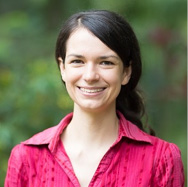
Rebecca Runting
Rebecca Runting’s research interests span environmental management, ecosystem services and ecological economics, with a particular focus on planning for multiple conservation and development objectives in Australia and Indonesian Borneo.
In 2011, Rebecca received a Bachelor of Environmental Management (Sustainable Development) with First Class Honors and a University Medal from the University of Queensland. During this time Rebecca developed a background in geographical information systems, ecological economics, urban and regional planning, and environmental science.
Rebecca’s PhD research is focused on developing and evaluating strategies to manage multiple ecosystem services under uncertain global change scenarios. Her research has developed approaches for applying economic methods (ecosystem service markets and modern portfolio theory) to protect coastal ecosystem services under sea level rise. She has also undertaken a review of how climate change and other drivers have been incorporated into ecosystem service assessments and decisions. Rebecca’s current work explores strategies to manage trade-offs between livestock production and greenhouse gas regulation under global change in Australia’s tropical rangelands. This research is cross-disciplinary, linking methods from ecological modelling, economics, and operations research.
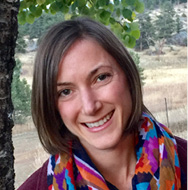
Katherine Sever
Katherine Sever holds a decade of experience in the conservation world and three years of experience dedicated to supporting market-based initiatives for ecosystem services protection. She recently developed a national geodatabase of environmental markets and their enabling conditions for Forest Trends’ Ecosystem Marketplace in collaboration with the EPA and USDA Office of Environmental Markets. These geospatial data have been incorporated into EPA’s EnviroAtlas to expand decision support for conservation planning and public policy. Concurrently, Katherine is investigating how emerging water quality markets strategize for performance monitoring, reporting, and regulatory integration as part of her master’s research at Colorado State University.
Prior to pursuing her graduate degree, Katherine supervised the logistics and implementation of capacity building programs for international conservation professionals with the Center for Protected Area Management. She also worked as a policy advisor for the US Peace Corps at the Peruvian National Protected Areas Service headquarters, where she formed part of an agency task force guiding the development of REDD+ forest carbon initiatives. Additionally, Katherine co-developed natural resource management and subsistence use policies for Peru’s then 75 national protected areas. Katherine began her international conservation work with the US Peace Corps in Paraguay, where she coordinated national training programs on climate change adaptation and forest conservation, as well as led stakeholder engagement and regulatory planning processes to designate a natural area for community sourcewater protection. Preceding her work abroad, Katherine performed biological field monitoring, wetland habitat assessments, and spatial data management for conservation organizations, public land management agencies, universities, and environmental firms.
Long before Katherine ever thought about her career, she fell in love with the natural world as a child roaming the pastures of her Oklahoma home. Her prolific track record as a Junior Ranger for numerous national parks sealed her fate as a lifelong conservation professional.
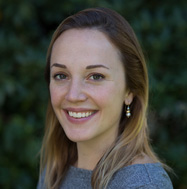
Laura Wood
Laura Wood is a Master of Environmental Management candidate at Duke’s Nicholas School of the Environment, concentrating in water resource management. This summer, she interned for Willamette Partnership’s Clean Water Program in Portland, Oregon. Prior to Duke, Laura taught environmental education in Jackson, WY, wrote grants for a small nonprofit that raised money for special projects within Grand Teton National Park, and conducted white bark pine research for the Bureau of Land Management in Missoula, MT. She holds a Bachelor of Arts in Biology from Colgate University.
Post-Conference Items
Program Book
View Online PDF
Abstract Book
View Online PDF
Photo Galleries
View Page
Speaker Presentations
View Page
Poster Presentations
View Page
Workshop Summaries
View Page
Town Hall Reports
View Page
Tweets by @ACES_Community


